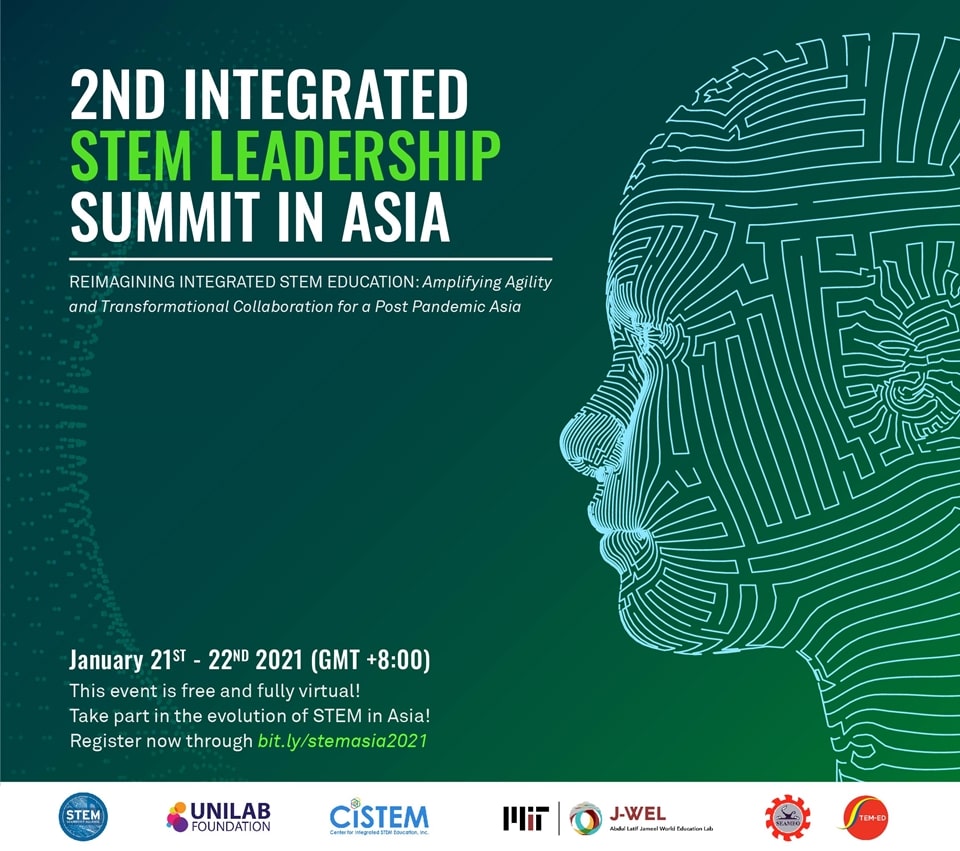
The integration of science, technology, engineering and mathematics (STEM) education that banks on the identity and culture of Southeast Asia summarizes the discussion of Dr. Glenn B. Gregorio, Director of the Southeast Asia Regional Center for Graduate Study and Research in Agriculture (SEARCA), at the 2nd Integrated STEM Leadership Summit in Asia held online on 21-22 January 2021.
The Summit on “Reimagining Integrated STEM Education: Amplifying Agility and Transformational Collaboration for a Post-Pandemic Asia” was jointly organized by the Secretariat of Southeast Asian Ministers of Education Organization (SEAMEO), and SEAMEO Regional Center for STEM Education (STEM-ED) with the STEM Leadership Alliance in the United States and the Philippines, Massachusetts Institute of Technology Jameel World Education Lab (MIT J-WEL), Unilab Foundation, and Centre for Integrated STEM Education (CISTEM, Inc).
Institutional leaders across Asia were invited to provide a platform for cross-sectoral dialogue and collaboration. The debut of the leadership summit centered on the current trends, future, and foresight in STEM while the second day tackled the convergence initiatives in STEM for the new digital age in Southeast Asia.
Among the panel discussants in the afternoon session of Day 2, Dr. Gregorio discussed how SEARCA addresses the challenges in the implementation of policies on STEM education. He highlighted three classifications of the challenges which are the technical, governance, and cultural in nature.
“We view STEM education as instrumental in preparing our youth for the future; and therefore, our collective ability of infusing sufficient knowledge and skills, or the science and practice, would constitute the technical aspect of STEM education,” Dr. Gregorio added.
Further, he emphasized that while experience on STEM education implementation of every country varies, curricular and pedagogical approaches were continuously being developed on the ground so students would gain the necessary scientific background and sufficient skills.
The SEARCA Director also gave his valuable insight on how the Center and other parts of the Southeast Asia region and around the world can support STEM ecosystem despite the health crisis.
“As the Director of SEARCA, I am always on the lookout for a brand of STEM education that carries and best capture the identity and culture of Southeast Asia, always in the Southeast Asian framework. This to me is where Southeast Asian countries must invest so that while we remain open to learning from the best practices in STEM education by more advanced countries, we have the additional mission of ensuring that this must also work towards the collective aspirations of the Southeast Asian region and the individual states comprising it.”
He also reinforced the importance of the Academe-Industry-Government (AIG) interconnectivity model during the panel discussion, which SEARCA has been promoting under its 11th Five-Year Plan focused on Accelerating Transformation Through Agricultural Innovation (ATTAIN).
To strengthen a regional STEM workforce development ecosystem, Dr. Gregorio recommends a joint discussion among sectors on how technology and innovation are drivers for change and growth. This leads to an exploration on how leaders in AIG can collaborate to develop the human resources needed for the regional economy to grow.
Other speakers in the panel discussion include Usec. Nepomuceno Malaluan of the Philippine Department of Education (DepEd); Sec. Fortunato dela Peña of the Philippine Department of Science and Technology (DOST); Dr. Totok Suprayitno of the Ministry of Education and Culture, Indonesia; Dr. Kitipong Promwong of the National Higher Education Science Research and Innovation Policy Council (NXPO), Thailand; and Dir. Rosanna A Urdaneta of the Technical Education and Skills Development Authority (TESDA), Philippines.